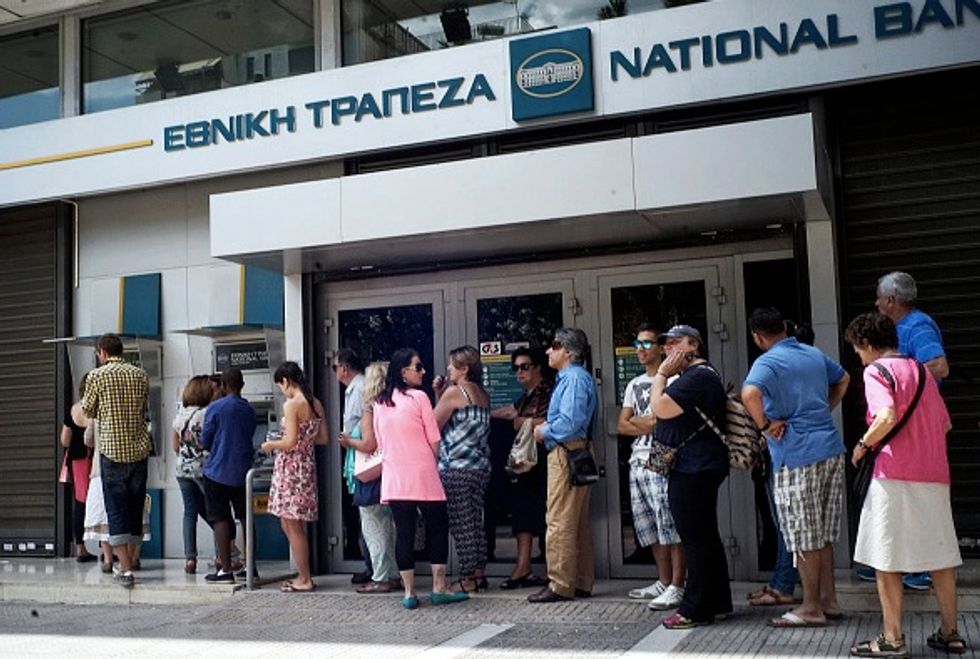It looked like it was all over between Greece and the European Union when Greek voters rejected EU bailout terms in a referendum on July 5.
But just over one week later the European Union reached a conditional agreement with Greece to provide a bailout in exchange for additional austerity measures.This agreement does not solve anything but merely kicks the can further into the future, delaying the day of reckoning when Greece will default on its debts.
To meet the terms of the bailout, Greece must enact a value added tax, reform pensions and cut its government budget. The Greek pension system, one of the world’s most generous, allowing some workers to retire as early as age 50, is a major cause of its financial problems.
 People celebrate in Athens on July 5, 2015 after the first exit-polls of the Greek referendum. Over 60 percent of Greeks rejected further austerity dictated by the country's EU-IMF creditors in a referendum, results from 20 percent of polling stations showed. (Image source: LOUISA GOULIAMAKI/AFP/Getty Images)
People celebrate in Athens on July 5, 2015 after the first exit-polls of the Greek referendum. Over 60 percent of Greeks rejected further austerity dictated by the country's EU-IMF creditors in a referendum, results from 20 percent of polling stations showed. (Image source: LOUISA GOULIAMAKI/AFP/Getty Images)
On July 15, the Greek parliament voted to accept the economic reforms proposed by the EU. Another vote was taken on July 23 on details of the reforms. Greek officials admit that the reforms are likely to fail.
Nevertheless, the European Central Bank (ECB) has taken steps to help Greece by providing a bridge loan of 7 billion euros so that Greece could make its July payments to the International Monetary Fund and the ECB.
European finance ministers and government officials fear that other heavily indebted countries, like Portugal, Italy, and Spain might follow if Greece goes off the euro. Thus they are willing to negotiate a third bailout, even if the prospects of Greece ever paying back the loan are slim. Leaders of the ECB want to create the illusion that they are in charge and that Greece needs the euro to prosper.
The European Union, the European Central Bank, and the International Monetary Fund foolishly lent money to the Greek government so it could pay back banks and private lenders. Now they must lend money to the Greek government so it can pay interest on those past bailout loans.
Every year since it joined the Eurozone in 2001, Greek government deficits have exceeded the limit of 3 percent of GDP required for membership, rising as high as 16 percent in 2010. Other European countries have also exceeded this limit on the size of government deficits, but Greece’s government debt as a percentage of GDP is the highest in the Eurozone.
Because of the large debts of the Greek government and uncertainty about the country’s financial future, residents withdrew much of their money from Greek banks. As a result, Greek banks have few euros left on their balance sheets to lend out. This hampers the ability of Greek businesses to fund their day-to-day operations.
Being a part of the Eurozone limits Greece’s options for dealing with its financial problems. With the euro as its currency, the Greek government cannot create money for Greek banks to use to lend to finance the operations of Greek businesses as it could if it had its own currency. Replacing the euro with the Greek drachma would enable the Greek central bank to lend to businesses, but would also lead to rapid inflation and devaluation of the drachma, raising the cost of imported goods for Greek residents.
 Greeks queue in front of the National Bank to use ATM to withdraw cash as Parliament holds an emergency session for the government's proposed referendum June 27, 2015 in Athens, Greece. (Image source: Milos Bicanski/Getty Images)
Greeks queue in front of the National Bank to use ATM to withdraw cash as Parliament holds an emergency session for the government's proposed referendum June 27, 2015 in Athens, Greece. (Image source: Milos Bicanski/Getty Images)
The conditions required of the Greek government, raising taxes and cutting spending, may lead to Greek businesses laying off more workers, resulting in short term suffering for many Greek residents. At some point, the Greeks may realize that default is their best option and elect a government willing to stand up to the other countries in the EU.
No easy solution exists for Greece’s financial problems. The nation is too far in debt to get out, but they could make some positive progress by increasing the age when workers can start collecting pensions, cutting some social spending and cutting their military budget. At some point the rest of the Eurozone will have to cancel some of Greece’s debt, even if Greece continues to be a member. But if the Eurozone countries continue to fail to require fiscal discipline of members, the breakup of the euro will almost certainly occur, although no one knows how long they can delay the day of reckoning.

–
TheBlaze contributor channel supports an open discourse on a range of views. The opinions expressed in this channel are solely those of each individual author.

 People celebrate in Athens on July 5, 2015 after the first exit-polls of the Greek referendum. Over 60 percent of Greeks rejected further austerity dictated by the country's EU-IMF creditors in a referendum, results from 20 percent of polling stations showed. (Image source: LOUISA GOULIAMAKI/AFP/Getty Images)
People celebrate in Athens on July 5, 2015 after the first exit-polls of the Greek referendum. Over 60 percent of Greeks rejected further austerity dictated by the country's EU-IMF creditors in a referendum, results from 20 percent of polling stations showed. (Image source: LOUISA GOULIAMAKI/AFP/Getty Images)
 Greeks queue in front of the National Bank to use ATM to withdraw cash as Parliament holds an emergency session for the government's proposed referendum June 27, 2015 in Athens, Greece. (Image source: Milos Bicanski/Getty Images)
Greeks queue in front of the National Bank to use ATM to withdraw cash as Parliament holds an emergency session for the government's proposed referendum June 27, 2015 in Athens, Greece. (Image source: Milos Bicanski/Getty Images)






